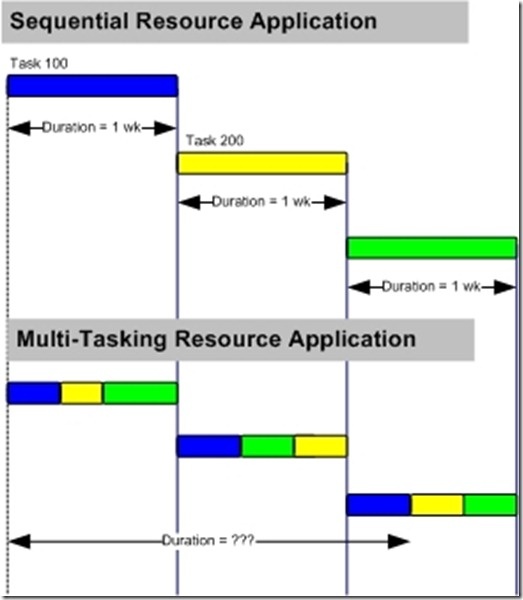Sometimes managers and executives praise multitasking employees as being those who can “juggle many tasks” and are able to “manage multiple projects simultaneously” without taking note of the damage that may be resulting.
Most of us fail to observe the damage that results from multitasking for several reasons:
- Multitasking is praised as a positive attribute
- Multitasking is commonplace and even expected in our workplaces
- We have observed multitasking nearly all our life, and no one has ever taken time to point out the negative effects of this conduct
So, what are the negative effects of multitasking?
- Switching between complex tasks reduces efficiency – When workers switch between tasks—especially complex tasks—efficiency is reduced because it takes time to get reoriented to the complexities at hand. Complex tasks frequently require the minds of the workers to hold many logical or sequential threads in their mind simultaneously in order to proceed effectively. Picking up all those threads and re-sequencing them make take up to an hour or longer after switching between complex tasks such as software development or the management of comprehensive projects. If three such task-switches take place in a single day, up to half of the productive day may be lost while the worker gets his or her “head” back into the complexities of the tasks at hand.
- Switching between complex tasks increases the likelihood of errors and omissions in the work – For the same reasons that task switching leads to reduced efficiency, it also leads to higher error rates. If just a few of the logical or sequential threads fail to be recovered during task switching, it is quite likely that errors or omissions will result.
- Switching between tasks increases the total duration of all interleaved tasks (regardless of total effort) – This can easily be seen in the following diagram.
 Task 100, which should have been completed at the end of one week is not completed until near the middle of week three. Task 200 which should have been completed at the end of week two is not completed until late in week three. Add in the inefficiencies and errors produced, and Task 300 (in green) would also not be completed by the end of week three.
Task 100, which should have been completed at the end of one week is not completed until near the middle of week three. Task 200 which should have been completed at the end of week two is not completed until late in week three. Add in the inefficiencies and errors produced, and Task 300 (in green) would also not be completed by the end of week three. - Multitasking provides plausible deniability cover for workers and their managers when delays, errors or omissions occur – We have all witnessed this, so further discussion is really not required.
- Multitasking makes scheduling and coordination nebulous and unreliable – When multitasking is being employed across organizations, the only reliable metric for project management is binary—either a task is complete or it is not complete. Percent-complete means nothing since the last five percent may take the same amount of time to actually deliver as the first 95 percent took.
- Multitasking is frequently encouraged by “policy”—usually unwritten—but leads to over-commitment, unreliability and delays– Multitasking makes it more difficult for employees to determine how much time it will actually take from start-to-finish, because:
- It is very difficult to properly estimate the impact of time lost due to the inefficiencies of task switching
- It is impossible to predict how many errors or omissions may be induced by task switching disruptions to the work
- It is nearly impossible to know precisely how many tasks must be interleaved over a given period of time since supervisors and managers expect (or even, demand) multitasking and new tasks may be added at any time
- Multitasking allows workers to appear “busy”—or even actually be busy—while still delaying critical tasks or even entire projects – For all of the reasons listed above, workers may be busy—even overwhelmed—while critical tasks lie buried in their stack of interleaved tasks. They have no clear sequence or priority when multitasking. (This is usually when a manager or executive steps in as insists that the worker stop multitasking—without actually using those words—and tells the employee to do what he or she should have been doing all along: focus on completing critical tasks in a priority sequence.)
We will talk more about the damaging effects of multitasking in a later post
Contact us with your questions or comments.



